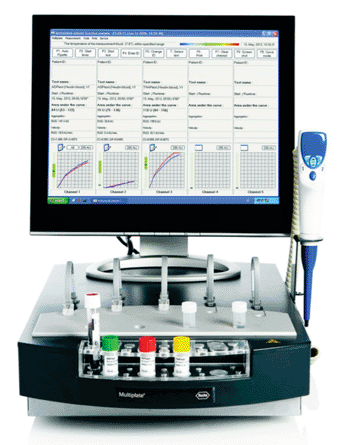Platelet Testing Helps Patients at Risk of Bleeding
By LabMedica International staff writers
Posted on 09 May 2013
Platelet function testing can help to improve outcomes for patients who have had a heart attack or stroke, or who are at risk of bleeding during or after surgery.Posted on 09 May 2013
Multiplate test results help to predict those who are at increased risk of thrombosis or bleeding and allow antiplatelet tharapy to be tailored to the needs of individual patients. The addition of Multiplate to Roche’s (Burgess Hill, United Kingdom) range of hemostasis analyzers provides companion diagnostics that aid clinical decision-making for hematologists, cardiologists, and anesthetists, and help to improve the care of patients with impaired platelet function. The Multiplate analyzer was acquired during the Roche takeover of Verum Diagnostica.

Image: The Roche Multiplate analyzer helps to improve outcomes for patients on antiplatelet therapy (Photo courtesy of Roche).
Impaired platelet function can lead to ischemic heart disease and cerebrovascular disease, two leading causes of death. Antiplatelet agents, in particular clopidogrel, are among the most widely used drugs in modern medicine and offer significant improvement in the prevention of thrombotic events. However, 20% of patients do not respond adequately to clopidogrel and are at increased risk of arterial thromboembolism. Often this is only detected when the patient experiences a secondary thrombotic event.
Other potent, but expensive, antiplatelet agents are now available, such as prasugrel and ticagrelor, which offer advantages and disadvantages over clopidogrel. It is important to identify patients who respond to clopidogrel so that antiplatelet therapy can be tailored accordingly and the risk of ischemic and cerebrovascular events reduced.
Multiplate detects both low and high response to clopidogrel, making it ideal to predict the risk of thrombosis, particularly following procedures such as percutaneous coronary intervention (PCI), and to predict the risk of intra- or post-oprative bleeding. This allows treatment to be tailored immediately, if necessary, to ensure patients are managed safely and effectively.
Related Links:
Roche UK













